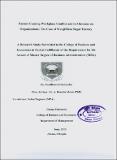| dc.description.abstract | Conflict is an inevitable normal part of life that occurs when the things individuals care about
appear incompatible. It may arise from a misunderstanding between co-workers or poor
communication within a department. No matter the cause, you can deal effectively with
I conflict in the workplace. Nonetheless, the outcome of poorly managed conflict can take an
enormous economic and emotional toll upon an organization and its members. The main
objective of the study is to identify the differenttypes, causes and outcomes of workplace
conflict in Wonji Sugar Factory. The study employs explanatory research design to
investigate the outcomes of workplace conflict on organizational performanceThe primary
data was collected using close ended questionnaire. The secondary data was collected using
books, articles, journals and other published materials. This study involves 307 sample
respondents. The questionnaires were distributed to the sample respondents of Wonji Sugar
Factory, which are selected using stratified systematic sampling. The Data collected were
analyzed using descriptive and inferential statistical tools such as factor analysis and
hierarchical cluster analysis. The results obtained from the analysis shows that Interpersonal
and Intergroup conflict are the major types of conflict in the organization.It also reveals that
personal factor, communication factor and structural factor as the three major sources of
I conflict. From the three factors, personal factor is found to be the major source of conflict.
With regard to outcomes of conflict, it shows that conflict has an impact on the employees'
physical and mental well-being as well as on their social relationships. Finally, the
researcher recommends that to minimize conflicts caused by these different factors, it will be
better if the organization improves its activities regarding employees' relation with
colleagues and managementas well as improve the communication system and overall reward
system.
Key words: Interpersonal Conflict, Intergroup Conflict, Personal, Communication and
Structural Factors | en |


